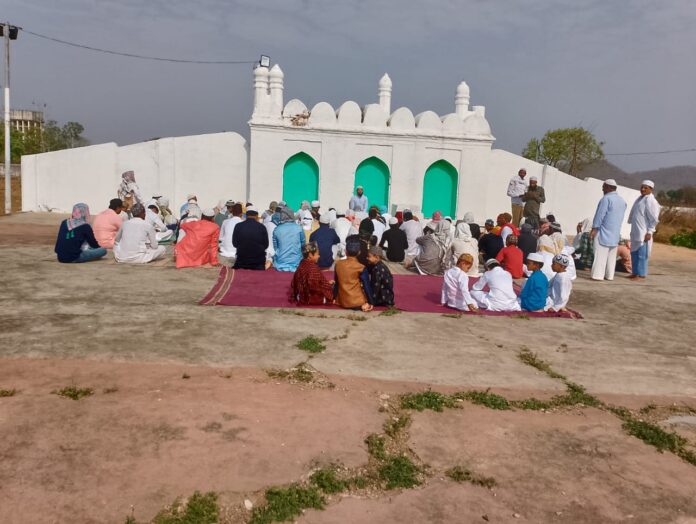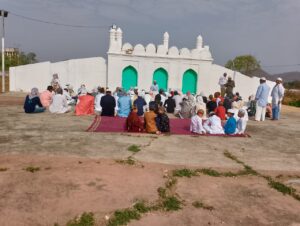
25 Muslims Families Allege Social Boycott by Jama Masjid Committee
Barred from Offering Namaz at Jama Masjid, Disallowed at Funerals, Weddings

Serious allegations have been made by a section of the Muslim community of Nagbhid (Chandrapur district) that they are not being allowed to offer Namaz in the city’s prominent Jama Masjid by the dominant sections of the community who control the Masjid’s management. They further alleged that they are facing social and religious boycott.
The controversy started more than twenty years ago when around twenty five Muslim families (a small fraction of the approximately 350 Muslim families in the city) were marked out as Wahabis/Tablighis and prevented from entering the Jama Masjid which was under the management of Barelvi Sunnis. These twenty five families are since then not allowed to offer Namaz, attend weddings or any other social functions or rituals including funerals of the Muslim community.
In 2005 Shahid Ghalib was not allowed to attend the funeral of his own father and made to stand at a distance when the last Namaz was offered. This trauma haunts him to this day. Mohammad Shahid too, it is alleged, was not allowed to offer Namaz at his father’s funeral in 2007.
Matters came to head when in 2007 Ikramkhan Usman Khan Pathan and 23 others filed a civil suit before the Civil Judge (Jr. Division) Nagbhid against the President of the then Jama Masjid Nasir Baig Kadar Baig Mirza, Vice President Nasir Khan Ijalluddin Khan and other office bearers for preventing them from offering Namaz at the Jama Masjid. In that case the respondent-Masjid Committee argued that the Plaintiffs were Wahabis/Tabliqhis/Deobandis whereas they are Barelvi Sunnis and their practices were different – for example, they argued that the Wahabis/ Tablighis do not offer ‘Salat Salam’ after the Namaz. Based on these differences the Jama Masjid committee defended their action of not allowing the so-called Wahabis/Tablighis to enter the Jama Masjid.
Riyaaz Sheikh who belongs to one of the families facing social boycott describes the situation as follows: We are Tablighis and follow the Nizamuddin Markaz and the Deobandi school. Since the last twenty years our lives have been made into hell because of this. At present the President of Jama Masjid committee is Siraj Gaffar Jada and under him the committee has continued the social boycott against us which started in the past. We are ostracized from the weddings of our own sisters. If we go to the wedding the Maulvi refuses to conduct the wedding as long as we are present. Similarly, we are not allowed to offer the last Namaz even for our fathers or close relatives. If we are present in the funeral the Maulvi refuses to perform the last rites. We are facing great harassment and mental torture.”
One of the most disturbing allegations against the Jama Masjid committee members is that whenever someone approaches one of the Tablighi families with a marriage proposal, the the person is indirectly informed that the girl belongs to a boycotted family and ‘warned’ against marriage alliance with such a family. It is alleged that there are cases where the marriage was broken after being fixed because the prospective groom’s family were informed of the boycott.
In 2019 the Tablighis were prevented from entering the burial ground to participate in a funeral. This lead to further conflicts and although the sufferers went to the police immediately, the FIR was registered by Nagbhid police nearly three months after the incident. Presently the matter is pending before the Judicial Magistrate, Nagbhid.
Do such internal rifts exist elsewhere?
Adv. Farhat Baig, a prominent leader of the Muslim community in Chandrapur city insists that the matter in Nagbhid is a local one, arising out of the egos of local Sunni and Tablighi leaders. “Neither of them are following the Sharia in its true spirit and are instead involved in petty disputes,” he says, “Such disputes do not exist in other places.”
However other Muslim leaders state that such differences within the community are quite widespread across Maharashtra especially in the rural areas. “Things may not be as bitter as in Nagbhid, but it cannot be denied that such internal disputes do exist in many places. In fact, various denominations set up separate Masjids to avoid direct confrontations. Fortunately, in recent times such confrontations have decreased as there is a concerted attempt to unite Muslims around common issues.”
What Does the Law Say?
Maharashtra has passed the Maharashtra Protection of People from Social Boycott (Prevention, Prohibition and Redressal) Act, 2016 which has made it an offence for any person or persons to impose social boycott on any other person or group of persons. Any person who imposes social boycott, uses his influence to cause social boycott, aids and abets social boycott or participates in illegal assembly to deliberate upon imposing social boycott can be charged under various sections of the law. They are liable to be punished with three years imprisonment and/or fine.


